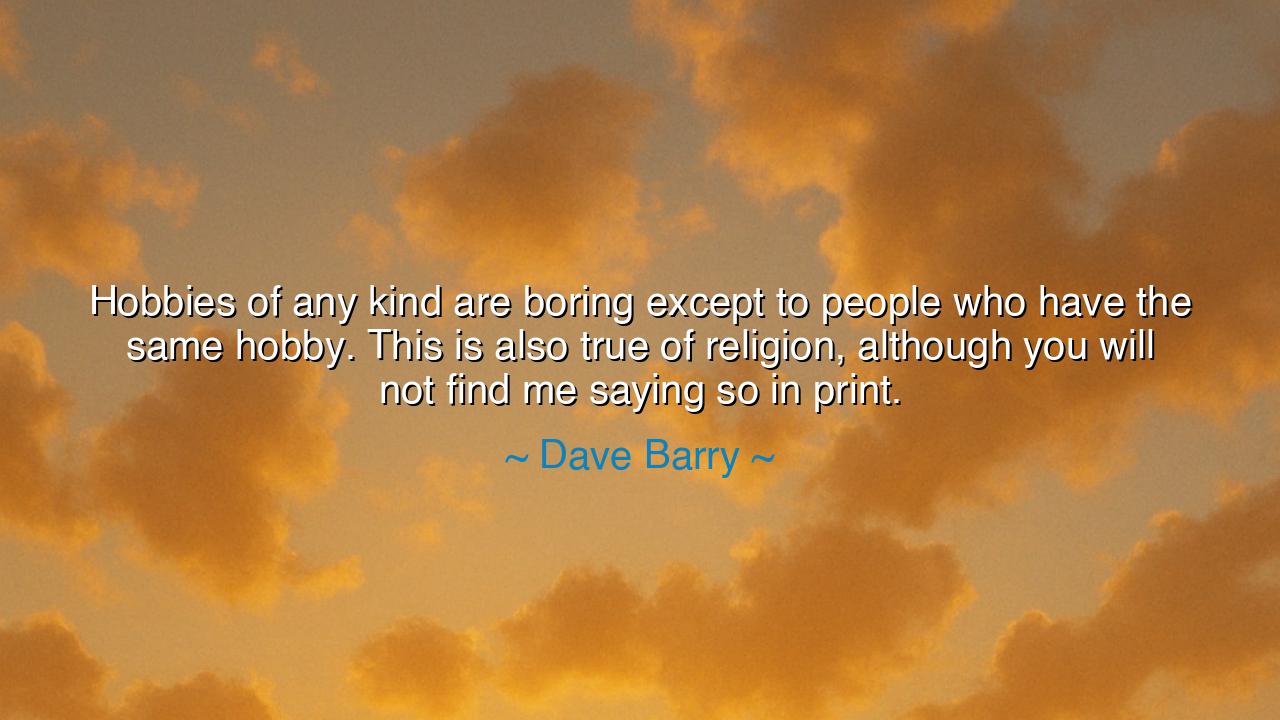
Hobbies of any kind are boring except to people who have the same
Hobbies of any kind are boring except to people who have the same hobby. This is also true of religion, although you will not find me saying so in print.






"Hobbies of any kind are boring except to people who have the same hobby. This is also true of religion, although you will not find me saying so in print." These words from Dave Barry carry with them a humorous, yet sharp insight into the nature of human behavior and belief. At first, his statement might seem lighthearted—perhaps even dismissive of certain pastimes or ideologies—but if we look deeper, we see a profound reflection on the human condition and our tendency to become deeply engrossed in our own interests and passions. Barry's observation points to a truth about exclusivity in hobbies and religions, the way that both can become not just a source of pleasure but of identity, and how difficult it is to relate those passions to those who do not share them.
From the dawn of time, humans have been creatures of habit and ritual. Each generation has had its own set of pursuits, from crafts and skills to beliefs and traditions. Consider the ancient craftspeople, the builders of the pyramids, or the scribes in Mesopotamia. To them, their work, their art, was not merely a hobby or a profession, but a calling, something that defined their place in society and connected them to the divine. These pursuits were meaningful and deeply significant, not only to the practitioners but to their communities as well. However, to those who had no part in those practices, they may have appeared boring, incomprehensible, or irrelevant. It is the same with hobbies and religions—what holds deep meaning to one person or group can seem foreign or tiresome to another.
Barry's point about religion echoes this same idea. In ancient times, people often held their faiths as the very core of their existence. Polytheistic religions in Greece and Rome, for instance, shaped the daily lives of the people, guiding their every action from the grand rituals to the smallest personal habits. The religious festivals, the ceremonies to honor the gods, were a source of community, where every individual found purpose and belonging. For the outsider, however, these practices might seem excessive, even absurd, as they did not share the same beliefs. Yet, to the faithful, these rituals were the fabric of life itself, and their deep commitment and passion for their beliefs made the practices meaningful beyond reason.
In the modern age, religion often becomes like a hobby—a deeply personal engagement with the divine or the spiritual world, meaningful only to those who share the same faith. To those on the outside, the practices and rituals of a religion can seem unnecessary or even trivial. The devout believer in any tradition knows well the way their religion enriches their soul, while others may find it hard to understand the appeal. Muslims, Christians, Jews, Hindus, and Buddhists all carry passionate convictions, but these beliefs can be inaccessible to those who do not share the same spiritual framework. In this sense, both hobbies and religions become exclusive spaces where the value is apparent only to the initiated.
Take the example of sports fans, a category that has long served as an emotional and social outlet for many. A football fan who invests his time and energy into following a team may see the sport as a vibrant and exciting spectacle, whereas someone indifferent to the game might find the endless commentary, statistics, and passionate debates to be dull and insipid. This divide—the ability to find joy and meaning in something that others see as unimportant or even tiresome—is a universal human experience. It highlights the ways in which our passions, whether for sports, hobbies, or religions, can bind us together with those who share our interests, while simultaneously alienating us from those who do not.
What Barry is asking us to recognize, then, is the subjectivity of value. What one person holds as sacred or important can be viewed as trivial to another. But this does not diminish the importance of the practice itself. It only underscores the depth of the human spirit, that we are all searching for meaning, connection, and purpose, albeit through different means. The hobbyist who spends hours perfecting a craft or the religious devotee who participates in spiritual practices both seek the same thing: the satisfaction of the soul. Whether it is in creating something beautiful or in connecting with a higher power, the fulfillment is deeply personal.
The lesson here is twofold: first, we must respect and acknowledge the diversity of beliefs and passions that shape human experience. We must understand that the passions that drive us might be incomprehensible to others, but that does not lessen their value. Second, we must recognize the importance of choice in all things—whether it is the choice to engage with a hobby or to commit to a religion. It is in the choosing that we find our purpose. To understand others, we must first understand the importance of their choices, even if they are not choices we ourselves would make.
Thus, the challenge of life is to recognize that each person’s hobbies and beliefs are not just trivial pursuits, but reflections of their search for meaning. We are all engaged in the same human quest for fulfillment, whether that comes through hobbies, religion, or something else entirely. Let us embrace the richness of these choices, honor them in others, and never forget that the beauty of the human spirit lies in our diversity of pursuits and passions.






AAdministratorAdministrator
Welcome, honored guests. Please leave a comment, we will respond soon